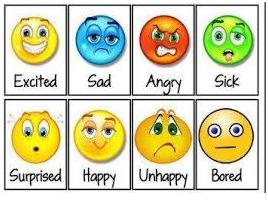
A mood is an emotional state, an angry, irritable, or sullen , a temporary state of mind or feeling.Moods differ from emotions, feelings or affects in that they are less specific, less intense, and less likely to be triggered by a particular stimulus or event. Moods are typically described as having either a positive or negative valence.
Our mood can play a significant role in how we live our lives. When we are happy, we tend to concentrate on the good things and ignore the negative aspects of things that happen around us. Similarly, when we are sad, we may be unable to think of anything but those negative aspects, to the extent that we may avoid the people or the activities that would help to mitigate the sadness and banish the mood.
Most of us experience quite intense moods in response to the events that occur in our lives. Some people, however, experience such dramatic ups and downs that they find it difficult to enjoy a good quality of life. These dramatic swings in mood may be extreme responses to external events, or they may have their origin in internal changes in the body’s chemistry.

Mood disorders
When mood swings are problematic, it could signify the presence of a mood disorder. There are several mood disorders, among them chronic depression, major depressive disorder and manic–depressive disorder (sometimes called bipolar disorder). The first two are characterized by periods of depressed mood interspersed with periods of normal mood. The third encompasses both downswings and upswings, and in the extreme these can take the form of cycles of very severe depression changing very rapidly to mania.
Symptoms of depression may include:
• insomnia (or increased sleep)
• reduced (or increased) appetite
• feelings of worthlessness
• recurrent thoughts of death








